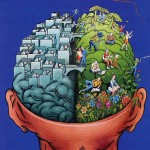“Obama Trusts Himself When All Men Doubt Him.”
 Or so a news headline runs.
Or so a news headline runs.
There may be doubts about Obama’s ability, but there is absolutely no doubt that both himself and him here refer to the same person, namely Obama. It is therefore bizarrely remarkable that we have to use two different words to denote the same concept. But on second thought, maybe they are not quite the same.

 I read a joke on Facebook, a witty play on words:
I read a joke on Facebook, a witty play on words: For long there has been an article (
For long there has been an article ( A student of mine told me that he had found a mistake in the lyrics of the national anthem of the United Kingdom. He said the name of this anthem, God Save the Queen, had a missing -s after the verb save. The subject, God, is singular in the third person, therefore the verb should be conjugated to agree with the subject accordingly.
A student of mine told me that he had found a mistake in the lyrics of the national anthem of the United Kingdom. He said the name of this anthem, God Save the Queen, had a missing -s after the verb save. The subject, God, is singular in the third person, therefore the verb should be conjugated to agree with the subject accordingly. The line was claimed to be taken from a Church Bulletin, although my Christian friend found it questionable. But let’s say, if it was really from the Church Bulletin, why would it talk about those “who are sick of our church” anyway? In fact, the funny thing about this sentence is that upon closer inspection, there can actually be two readings: one which is somewhat absurd (but perhaps more obvious at first glance), and, one which sounds more reasonable (and is thus probably the intended reading).
The line was claimed to be taken from a Church Bulletin, although my Christian friend found it questionable. But let’s say, if it was really from the Church Bulletin, why would it talk about those “who are sick of our church” anyway? In fact, the funny thing about this sentence is that upon closer inspection, there can actually be two readings: one which is somewhat absurd (but perhaps more obvious at first glance), and, one which sounds more reasonable (and is thus probably the intended reading).